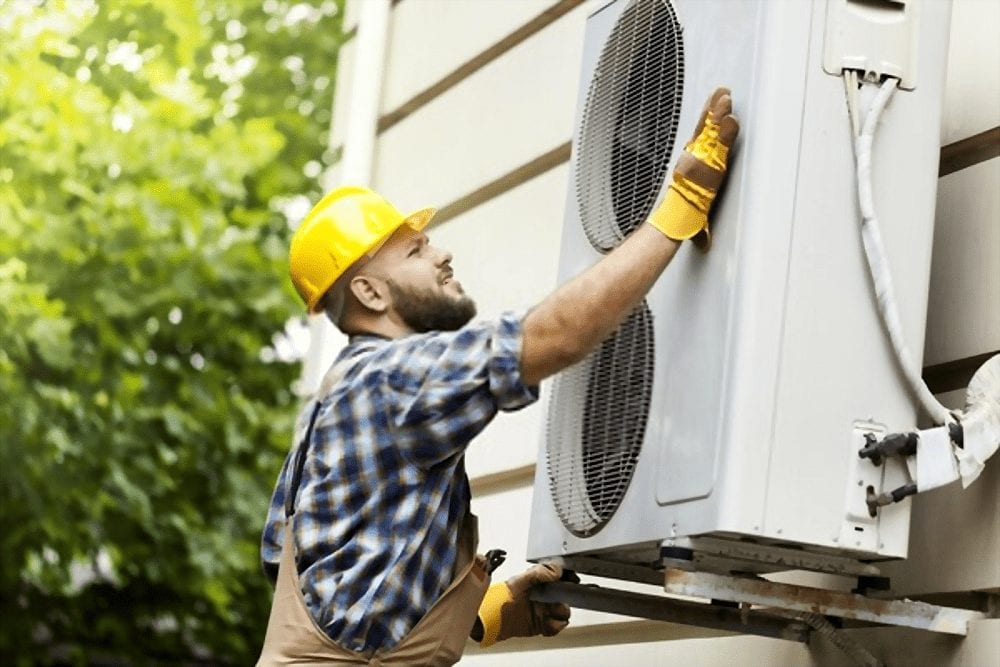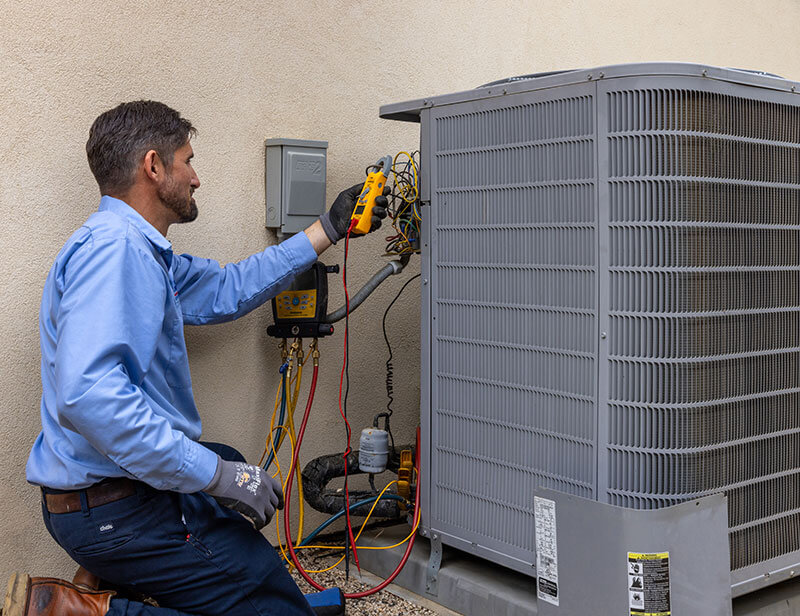Selecting Between a Warm Pump and Heater: Key Factors To Consider for Your HVAC Requirements
When evaluating home heating options for a/c requires, the choice in between a heatpump and a furnace can be complicated. Each system supplies distinctive advantages tailored to specific climates and power performance objectives. Understanding these differences is essential for making an informed option. Secret factors such as installation prices and environmental impact even more complicate the selection process. Which alternative truly aligns with one's comfort and sustainability choices? The following areas will certainly check out these factors to consider thoroughly.
Understanding Warm Pumps: Just How They Function and Their Benefits
While many homeowners think about different heating options, understanding just how warmth pumps feature and their advantages can greatly affect their choice. Heatpump operate by transferring heat instead of creating it. In the winter months, they draw out warmth from the outside air or ground and move it inside, while in the summertime, they reverse this process, cooling down the home by eliminating warm outside. This dual functionality makes them functional for year-round climate control.One of the primary advantages of warm pumps is their power efficiency. They utilize considerably much less electricity contrasted to standard furnace, possibly leading to reduced utility bills (heat pump replacement ooltewah tn). Additionally, heatpump have a smaller carbon impact, making them an eco friendly option. They additionally call for less maintenance than standard systems, contributing to long-lasting price savings. On the whole, understanding the technicians and benefits of heat pumps can help house owners make informed decisions concerning their home heating and cooling down needs
Discovering Furnaces: Kinds, Procedure, and Benefits
Heaters come in different types, including gas, electric, and oil models, each with unique operational systems. Recognizing these distinctions is important, as they influence performance and home heating performance. Additionally, heating systems use numerous advantages, such as constant warmth result and dependability in cooler climates.
Kinds of Heating systems
Heating unit can vary substantially in layout and procedure, with furnaces being a popular selection among homeowners. There are several types of heating systems, each making use of different fuel resources and technologies. Gas heaters are usual, leveraging gas to produce heat efficiently. Electric furnaces, on the various other hand, make use of electric resistance to produce heat, usually favored for their simple installation. Oil furnaces, while less typical, are efficient in locations with minimal gas access (heat pump installation ooltewah tn). Furthermore, condensing furnaces optimize energy effectiveness by recording and recycling exhaust gases. Each kind operates through a system of warm exchangers and ductwork to disperse cozy air throughout a home. Understanding the distinctions in between these heating system types is necessary for notified cooling and heating decisions
Benefits of Furnaces
For property owners looking for trustworthy warmth throughout chilly months, the advantages of furnaces are considerable. Heating systems offer constant home heating, making sure also temperature levels throughout the home. They are specifically effective in severe cold, typically exceeding heatpump in frigid problems. Various types, including gas, electrical, and oil heaters, provide versatility to fulfill diverse requirements and preferences.Furnaces additionally tend to have reduced first setup prices contrasted to heatpump, making them an extra accessible alternative for many. Their robust design contributes to a much longer life-span, with lots of devices lasting over 15 years with proper maintenance. Additionally, contemporary heaters are frequently geared up with innovative technology for improved efficiency, which can lead to minimized power expenses. On the whole, heating systems continue to be a reliable selection for efficient home heating.

Power Performance: Comparing Heat Pumps and Furnaces
When contrasting power efficiency between warmth pumps and furnaces, the Seasonal Energy Effectiveness Ratio (SEER) plays an important role in identifying efficiency. Additionally, a functional cost analysis reveals the long-term economic effects of each system. Recognizing these variables can direct property owners in making informed decisions regarding their heating solutions.
Seasonal Power Effectiveness Ratio
Energy efficiency plays an important role in the decision-making process in between heatpump and heaters, specifically when considering the Seasonal Energy Performance Ratio (SEER) This statistics actions the cooling performance of heat pumps over a whole cooling period, offering a standard method to review efficiency. Higher SEER rankings indicate greater energy effectiveness, converting to lower energy intake and decreased utility expenses. In comparison, heaters are usually assessed making use of the Yearly Fuel Application Effectiveness (AFUE) ranking, which reflects heating efficiency. When contrasting these 2 systems, house owners must focus on SEER scores for heatpump, as they straight effect total energy financial savings and environmental sustainability. An extensive understanding of SEER can notably affect the lasting contentment and cost-effectiveness of the chosen cooling and heating option.
Functional Cost Evaluation
Recognizing the functional prices associated with warmth pumps and furnaces is essential for homeowners evaluating their choices. Heat pumps normally supply higher energy efficiency, transforming electrical power into warmth with marginal waste. This leads to reduced regular monthly utility bills, specifically in modest environments. Conversely, typical furnaces, particularly gas designs, may have reduced upfront costs but can incur higher operational expenses in time because of fuel rates and efficiency ratings.Moreover, heatpump can function as both heating and cooling systems, potentially reducing the need for separate heating and cooling units. While first financial investments for warm pumps may be greater, their long-term cost savings in power efficiency can make them a more affordable option for lots of homes. Careful analysis of neighborhood power rates is necessary to establish the very best alternative.
Installment Costs: What to Expect for each and every Heating Unit
Setup expenses for heating unit can vary substantially between heatpump and furnaces, affecting house owners' decisions. Heat pumps usually have greater upfront installment costs, generally ranging from $3,500 to $8,000, relying on read review the unit dimension and complexity of installment. This includes the outdoor system, indoor handling system, and needed ductwork alterations. On the other hand, heating systems have a tendency to have lower first costs, balancing in between $2,500 and $6,000, which can see this be appealing for budget-conscious home owners. Installment costs can increase if comprehensive ductwork is required.Moreover, the selection of gas kind for heating systems-- all-natural gas, propane, or electric-- can likewise affect installment prices. While heatpump use power effectiveness, their preliminary financial investment might hinder some buyers. Eventually, reviewing setup expenses along with long-term cost savings and performance will assist homeowners in making informed decisions regarding their heating unit.
Environment Factors To Consider: Which System Does Better in Your Area
Exactly how do climate conditions affect the performance of heating unit? The performance of warm pumps and heaters can differ considerably relying on the regional climate. In moderate climates, heatpump excel by efficiently transferring warm from the outdoors air, making them an energy-saving choice. Their efficiency lessens in incredibly cool temperature levels, where they may have a hard time to remove sufficient warm. Alternatively, heaters, particularly gas models, provide dependable and regular warmth no matter exterior problems, making them more effective in cooler regions.In areas that experience milder wintertimes, heatpump can operate properly why not try this out year-round, providing both heating & cooling. On the other hand, regions with harsh winter seasons typically gain from the effectiveness of heaters. Ultimately, comprehending the regional environment is crucial when deciding in between a heatpump and a heating system, as it straight affects their functional efficiency and general efficiency.
Maintenance Requirements: Long-Term Look After Warmth Pumps vs. Furnaces
While both warmth pumps and heaters need regular maintenance to ensure peak efficiency, their specific needs and treatment routines vary significantly. Heating systems normally require much less constant attention, with yearly assessments being adequate to check for gas leaks, clean filters, and analyze general capability. Their simpler style typically enables for uncomplicated repairs.In contrast, heatpump require semiannual upkeep due to their twin function in cooling and heating. This consists of cleansing coils, examining refrigerant degrees, and making sure that both the interior and outdoor systems function at their best. In addition, heatpump maintenance usually entails more detailed parts, making specialist maintenance essential.Neglecting maintenance can result in lessened effectiveness and boosted energy costs for both systems. Ultimately, house owners ought to think about these lasting treatment demands when picking between a heatpump and a heater, as proactive maintenance can extend the life expectancy and efficiency of either system significantly.
Environmental Impact: Selecting a Sustainable Heating Choice
The environmental influence of heater is a crucial evaluation for home owners looking for sustainable options. Warm pumps are usually extra energy-efficient than traditional heaters, as they transfer heat instead than generate it, greatly lowering carbon discharges. By utilizing renewable resource sources, such as geothermal or air-source warm pumps, home owners can further minimize their environmental footprint.On the various other hand, natural gas heating systems release greenhouse gases and add to air contamination, though they often give higher heat output. Nevertheless, innovations in technology have led to the development of high-efficiency heating systems that reduce emissions.Ultimately, choosing a home heating system includes evaluating performance versus ecological effect. Homeowners are motivated to review regional power sources and rewards for sustainable systems, making certain a selection that lines up with both personal comfort and environmental duty. The choice affects not just prompt convenience yet additionally long-term sustainability and ecological health.
Frequently Asked Inquiries
Exactly How Long Do Heat Pumps and Furnaces Typically Last?
The life expectancy of heat pumps usually varies from 15 to 20 years, while heaters can last in between 15 to 30 years. Routine upkeep substantially affects their longevity and effectiveness in giving home heating remedies.
Can I Use a Heatpump in Extremely Cold Climates?
Heat pumps can operate in very cool climates, however their efficiency reduces as temperature levels decline. In such conditions, supplementary heating sources might be essential to maintain comfortable indoor temperature levels and guarantee peak performance.

What Is the Sound Degree of Warm Pumps Versus Furnaces?
The noise degrees of warmth pumps and heating systems vary substantially. Generally, heat pumps run more quietly than conventional heating systems, making them more effective for those delicate to sound, while heaters may produce louder functional sounds during heating cycles.
Are Warm Pumps Suitable for Both Heating and Air conditioning?
Heatpump are certainly appropriate for both cooling and heating (ductless mini splits). They operate by moving heat, supplying efficient temperature control year-round, making them a flexible option for house owners seeking an all-in-one heating and cooling solution
What Size Heater Do I Need for My Home?
Establishing the ideal dimension furnace for a home calls for evaluating elements such as square footage, insulation top quality, local environment, and the home's design. Consulting a specialist can assure a precise analysis and perfect comfort. Warmth pumps generally supply greater power effectiveness, converting electrical energy into warm with very little waste. In moderate climates, warmth pumps succeed by effectively transferring warm from the outside air, making them an energy-saving choice. Conversely, heating systems, specifically gas models, give regular and trusted heat regardless of exterior conditions, making them better in cooler regions.In locations that experience milder wintertimes, heat pumps can operate effectively year-round, supplying both heating and air conditioning. Warm pumps are usually extra energy-efficient than standard heaters, as they transfer warm rather than produce it, substantially decreasing carbon exhausts. By using sustainable power sources, such as geothermal or air-source warmth pumps, property owners can even more decrease their environmental footprint.On the various other hand, natural gas heating systems give off greenhouse gases and add to air pollution, though they usually give greater heat output.
Comments on “Elevate Your Home’s Efficiency with Routine heat pump service”